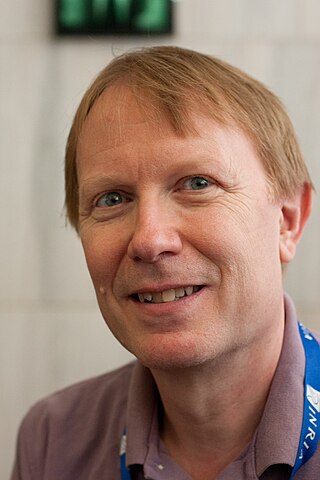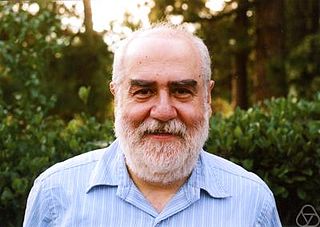Research
Naor's research concerns metric spaces, their properties, and related algorithms, including improved upper bounds on the Grothendieck inequality, applications of this inequality, and research on metrical task systems.
Assaf Naor | |
|---|---|
| Born | May 7, 1975 |
| Nationality | American, Czech, Israeli |
| Alma mater | Hebrew University of Jerusalem |
| Awards | EMS Prize (2008) Salem Prize (2008) Bôcher Memorial Prize (2011) Nemmers Prize (2018) Ostrowski Prize (2019) |
| Scientific career | |
| Fields | Mathematics, computer science |
| Institutions | Princeton University, NYU, Microsoft Research |
| Doctoral advisor | Joram Lindenstrauss |
Assaf Naor (born May 7, 1975) is an Israeli American and Czech mathematician, computer scientist, and a professor of mathematics at Princeton University. [1] [2]
Naor earned a baccalaureate from Hebrew University of Jerusalem in 1996 and a doctorate from the same university in 2002, under the supervision of Joram Lindenstrauss. [3] [4] He worked at Microsoft Research from 2002 until 2007, with an affiliated faculty position at the University of Washington, and joined the NYU faculty in 2006. [3]
Naor's research concerns metric spaces, their properties, and related algorithms, including improved upper bounds on the Grothendieck inequality, applications of this inequality, and research on metrical task systems.
Naor won the Bergmann award of the United States – Israel Binational Science Foundation in 2007, [5] and the Pazy award of the BSF in 2011. [6] In 2012 he was one of four faculty winners of the Leonard Blavatnik Award of the New York Academy of Sciences, given to young scientists and engineers in New York, New Jersey, and Connecticut. [7]
He won the Salem Prize in 2008 for "contributions to the structural theory of metric spaces and its applications to computer science", [8] and in the same year was given a European Mathematical Society Prize [3] (one of ten awarded to outstanding younger mathematicians). He won the Bôcher Memorial Prize in 2011 "for introducing new invariants of metric spaces and for applying his new understanding of the distortion between various metric structures to theoretical computer science". [9] In 2012 he became a fellow of the American Mathematical Society. [10] He received the Nemmers Prize in Mathematics in 2018 and in 2019 the Ostrowski Prize. [11]
He gave an invited talk at the International Congress of Mathematicians in 2010, on the topic of "Functional Analysis and Applications". [12]

The American Mathematical Society (AMS) is an association of professional mathematicians dedicated to the interests of mathematical research and scholarship, and serves the national and international community through its publications, meetings, advocacy and other programs.

The Weizmann Institute of Science is a public research university in Rehovot, Israel, established in 1934, 14 years before the State of Israel. It differs from other Israeli universities in that it offers postgraduate-only degrees in the natural and exact sciences.

Charles Louis Fefferman is an American mathematician at Princeton University, where he is currently the Herbert E. Jones, Jr. '43 University Professor of Mathematics. He was awarded the Fields Medal in 1978 for his contributions to mathematical analysis.
The Bôcher Memorial Prize was founded by the American Mathematical Society in 1923 in memory of Maxime Bôcher with an initial endowment of $1,450. It is awarded every three years for a notable research work in analysis that has appeared during the past six years. The work must be published in a recognized, peer-reviewed venue. The current award is $5,000.

The Courant Institute of Mathematical Sciences is the mathematics research school of New York University (NYU), and is among the most prestigious mathematics schools and mathematical sciences research centers in the world. Founded in 1935, it is named after Richard Courant, one of the founders of the Courant Institute and also a mathematics professor at New York University from 1936 to 1972, and serves as a center for research and advanced training in computer science and mathematics. It is located on Gould Plaza next to the Stern School of Business and the economics department of the College of Arts and Science.

Akshay Venkatesh is an Australian mathematician and a professor at the School of Mathematics at the Institute for Advanced Study. His research interests are in the fields of counting, equidistribution problems in automorphic forms and number theory, in particular representation theory, locally symmetric spaces, ergodic theory, and algebraic topology.
Charles Samuel Peskin is an American mathematician known for his work in the mathematical modeling of blood flow in the heart. Such calculations are useful in the design of artificial heart valves. From this work has emerged an original computational method for fluid-structure interaction that is now called the “immersed boundary method", which allows the coupling between deformable immersed structures and fluid flows to be handled in a computationally tractable way. With his students and colleagues, Peskin also has worked on mathematical models of such systems as the inner ear, arterial pulse, blood clotting, congenital heart disease, light adaptation in the retina, control of ovulation number, control of plasmid replication, molecular dynamics, and molecular motors.
The United States-Israel Binational Science Foundation (BSF) is a grant-awarding institution that promotes collaborative research in a wide range of basic and applied scientific disciplines, established in 1972 by an agreement between the governments of the United States and Israel. Numerous scientists participating in BSF programs have won prestigious awards such as the Nobel, Lasker and Wolf prizes. The Foundation grant recipients include 43 Nobel Prize laureates, 19 winners of the Lasker-DeBakey Clinical Medical Research Award, and 38 recipients of the Wolf Prize.

Leon Melvyn Simon, born in 1945, is a Leroy P. Steele Prize and Bôcher Prize-winning mathematician, known for deep contributions to the fields of geometric analysis, geometric measure theory, and partial differential equations. He is currently Professor Emeritus in the Mathematics Department at Stanford University.

Joseph S. B. Mitchell is an American computer scientist and mathematician. He is Distinguished Professor and Department Chair of Applied Mathematics and Statistics and Research Professor of Computer Science at Stony Brook University.

Gunther Alberto Uhlmann Arancibia is a mathematician whose research focuses on inverse problems and imaging, microlocal analysis, partial differential equations and invisibility.
Leslie Frederick Greengard is an American mathematician, physicist and computer scientist. He is co-inventor with Vladimir Rokhlin Jr. of the fast multipole method (FMM) in 1987, recognized as one of the top-ten algorithms of the 20th century.
Lawrence David Guth is a professor of mathematics at the Massachusetts Institute of Technology.

Franck Barthe is a French mathematician. He was awarded the European Congress of Mathematics (ECM) prize in 2004. He is working as a professor of mathematics at Paul Sabatier University.

Shiri Artstein-Avidan is an Israeli mathematician who in 2015 won the Erdős Prize. She specializes in convex geometry and asymptotic geometric analysis, and is a professor of mathematics at Tel Aviv University.
Oded Regev is an Israeli-American theoretical computer scientist and mathematician. He is a professor of computer science at the Courant institute at New York University. He is best known for his work in lattice-based cryptography, and in particular for introducing the learning with errors problem.
Jin-Yi Cai is a Chinese American mathematician and computer scientist. He is a professor of computer science, and also the Steenbock Professor of Mathematical Sciences at the University of Wisconsin–Madison. His research is in theoretical computer science, especially computational complexity theory. In recent years he has concentrated on the classification of computational counting problems, especially counting graph homomorphisms, counting constraint satisfaction problems, and Holant problems as related to holographic algorithms.

Ronen Eldan is an Israeli mathematician. Eldan is a professor at the Weizmann Institute of Science working on probability theory, mathematical analysis, theoretical computer science and the theory of machine learning. He received the 2018 Erdős Prize, the 2022 Blavatnik Award for Young Scientists and the 2023 New Horizons Breakthrough Prize in Mathematics. He was a speaker at the 2022 International Congress of Mathematicians.